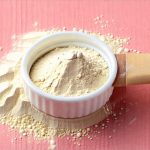The pursuit of fitness often leads individuals towards nutritional supplementation, with protein powder being one of the most popular choices. It’s marketed as essential for muscle growth, recovery, and overall well-being, leading to increased consumption across diverse populations – from dedicated athletes to those simply aiming for a healthier lifestyle. However, alongside its benefits, an increasing number of people are reporting uncomfortable side effects associated with excessive protein powder intake, most notably bloating. This isn’t necessarily indicative of a problem with protein itself, but rather the potential consequences of rapid or concentrated consumption, individual sensitivities, or underlying digestive issues exacerbated by supplementation. Understanding why this happens and how to mitigate it is crucial for maximizing benefits while minimizing discomfort.
Bloating from protein powder isn’t always a straightforward issue; it can stem from several interconnected factors ranging from the type of protein used to pre-existing gut health conditions. It’s important to distinguish between normal digestive processes and problematic bloating, which typically involves excessive gas, abdominal distension, pain, and sometimes even changes in bowel habits. While some degree of fullness after a meal is expected, persistent or severe bloating should prompt investigation into the root cause. Many assume it’s simply ‘too much protein,’ but often the issue lies deeper – within ingredient sensitivities, digestive enzyme deficiencies, or the way the body processes concentrated nutrients. This article aims to explore these facets in detail, offering insights and strategies for managing bloating associated with protein powder use.
Understanding Protein Powder & Digestive Distress
Protein powders aren’t created equal. The source of the protein—whey, casein, soy, pea, rice, hemp, or blends—significantly impacts how easily it’s digested. Whey protein concentrate, for example, contains lactose and can cause bloating in individuals with lactose intolerance. Whey isolate and hydrolysate have lower lactose content and are generally easier to digest, but even these aren’t foolproof. Plant-based proteins, while excellent alternatives, contain compounds like phytates and lectins that some people find difficult to process, leading to gas and discomfort. Furthermore, the additives often found in protein powders—artificial sweeteners, thickeners (like guar gum or xanthan gum), and flavorings – can contribute to bloating, particularly for those with sensitive digestive systems. The body might struggle to break down these complex ingredients effectively, resulting in fermentation within the gut and subsequent gas production.
The speed at which protein is consumed also plays a vital role. Downing a large shake quickly overwhelms the digestive system’s capacity to efficiently process the amino acids. This rapid influx can lead to incomplete digestion and an increased likelihood of bloating. The gut relies on enzymes to break down proteins into smaller, absorbable units. If the volume exceeds what these enzymes can handle at once, undigested protein ferments in the colon, causing gas and discomfort. Finally, pre-existing digestive conditions – such as Irritable Bowel Syndrome (IBS), Small Intestinal Bacterial Overgrowth (SIBO), or enzyme deficiencies – are significantly aggravated by concentrated protein intake. These conditions impair the gut’s ability to efficiently process nutrients, making individuals more susceptible to bloating from even small amounts of protein powder.
Consider these points when evaluating your protein powder and its potential impact:
– Is it a source you tolerate well? (Whey vs. plant-based)
– Does it contain ingredients known to cause digestive issues for you? (Artificial sweeteners, gums)
– Are you consuming large quantities quickly?
– Do you have any underlying digestive concerns?
Strategies for Minimizing Bloating
The good news is that bloating from protein powder can often be managed with a few adjustments. The first step is identifying the potential trigger. This might involve switching to a different type of protein, opting for a brand with fewer additives, or reducing the serving size. Experimenting with various options and carefully monitoring your body’s response is key. If whey protein seems to be the culprit, transitioning to a plant-based alternative like pea or rice protein can make a significant difference. For those who tolerate whey but experience bloating, switching from concentrate to isolate or hydrolysate may help reduce lactose intake. Always read the ingredient list carefully and choose products with minimal artificial ingredients.
Beyond protein source, optimizing digestive support is crucial. This includes incorporating digestive enzymes into your routine, particularly if you suspect enzyme deficiencies. Enzymes like protease (for breaking down proteins) and lactase (for digesting lactose) can aid in digestion and reduce fermentation in the gut. Another effective strategy involves slowing down consumption. Sip your protein shake over a longer period rather than gulping it down quickly. This gives your digestive system time to process the nutrients effectively. Finally, paying attention to overall gut health is paramount. A diet rich in fiber, probiotics (from fermented foods or supplements), and adequate hydration supports a healthy microbiome, enhancing digestion and reducing bloating.
Addressing Underlying Digestive Issues
Bloating that persists despite adjustments to protein powder intake might indicate an underlying digestive issue requiring professional evaluation. Ignoring chronic bloating can lead to nutritional deficiencies and long-term health problems. IBS is a common culprit, characterized by abdominal pain, bloating, gas, diarrhea, and constipation. Diagnosing IBS typically involves eliminating other potential causes and identifying specific trigger foods through dietary changes and symptom tracking. SIBO, where excessive bacteria accumulate in the small intestine, can also cause significant bloating and digestive discomfort. Diagnosis usually requires a breath test to detect hydrogen or methane levels indicative of bacterial overgrowth.
If you suspect an underlying condition, consulting a gastroenterologist is essential. They can perform necessary tests, provide an accurate diagnosis, and recommend appropriate treatment strategies. These may include dietary modifications (like a low-FODMAP diet), probiotics tailored to your specific gut microbiome, or medications to address the underlying issue. It’s important to remember that self-treating digestive problems can be detrimental; professional guidance ensures you receive the most effective and safe care. Do not attempt to diagnose yourself – seeking expert medical advice is crucial for long-term health management.
The Role of Hydration & Fiber
Adequate hydration is often overlooked but plays a vital role in preventing bloating, especially when increasing protein intake. Protein metabolism produces nitrogenous waste that the kidneys must eliminate. Insufficient water intake forces the kidneys to work harder and can lead to dehydration, exacerbating digestive issues and contributing to bloating. Aim for at least eight glasses of water daily, and increase your intake if you’re physically active or live in a hot climate. Electrolyte balance is also important; consider adding electrolytes to your water, especially after intense workouts.
Fiber works synergistically with hydration to promote healthy digestion. It adds bulk to the stool, facilitating regular bowel movements and preventing constipation, which can contribute to bloating. Fiber also feeds beneficial gut bacteria, supporting a healthy microbiome. However, introducing fiber too quickly can initially worsen bloating; start slowly and gradually increase your intake over time. Good sources of fiber include fruits, vegetables, whole grains, legumes, and seeds. Combining increased protein intake with a fiber-rich diet and sufficient hydration creates an optimal environment for digestion and minimizes the risk of bloating.
Optimizing Protein Timing & Quantity
Finally, consider when and how much protein you’re consuming. Spreading your daily protein intake across multiple meals rather than concentrating it in one or two large shakes reduces the burden on your digestive system. This allows enzymes to work more effectively and minimizes fermentation in the colon. Also, avoid consuming protein powder immediately before strenuous exercise; this can divert blood flow away from the gut and impair digestion. Instead, consume protein after your workout to support muscle recovery without compromising digestive function.
Determining the optimal amount of protein is also crucial. While individual needs vary based on activity level, body weight, and health goals, exceeding recommended daily allowances doesn’t necessarily translate to better results – it can simply overload your digestive system. A general guideline is 0.8-1.2 grams of protein per kilogram of body weight for moderately active individuals, with athletes potentially requiring slightly more. Listen to your body and adjust your intake based on how you feel. If bloating persists despite other interventions, consider reducing your overall protein consumption or consulting a registered dietitian to personalize your nutritional plan. Understanding why some protein powders can cause issues is the first step towards relief. For those struggling with frequent episodes, exploring low volume meals may offer some reprieve. Sometimes, a seemingly unrelated event like crying can surprisingly provide relief—learn why you might feel relief. In chronic cases, the role of gut biofeedback can be a game changer. Furthermore, investigating gastric emptying may reveal underlying issues and finally, consider how your gut reacts to common medications.


















